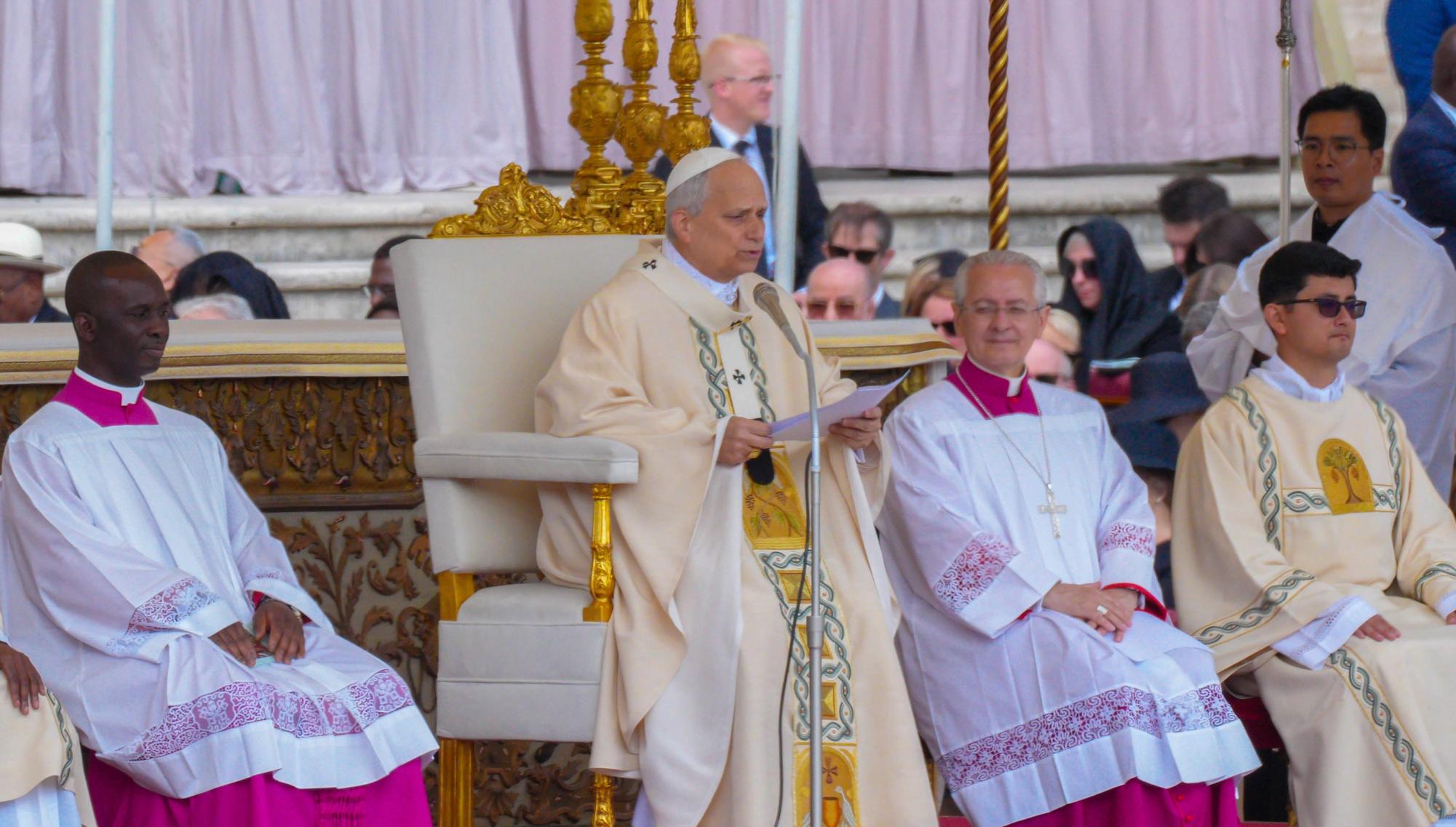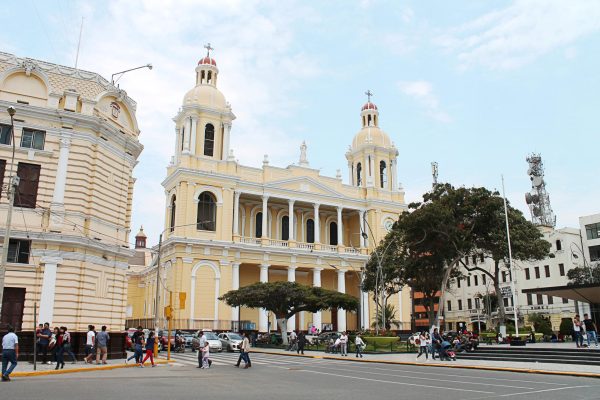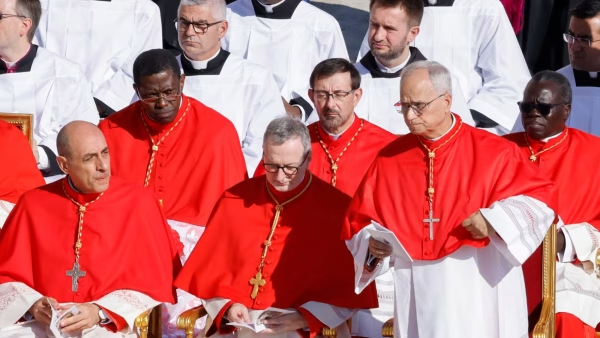Georgetown University community members praised the newly inaugurated Pope Leo XIV’s leadership, values and humility following the start of his pontificate May 18.
After former Pope Francis died April 21, the College of Cardinals, the body that selects the next pope, elected Cardinal Robert Francis Prevost, a Chicago native who spent years as a missionary in Peru, as pope May 8. Prevost, who chose the name Leo for his pontificate, became the first pope from the United States, and scholars regard him as a unifier who will uphold Francis’ mission of helping poor and marginalized communities.

Kim Daniels — an adviser to the Vatican’s communications team and the director of Georgetown’s Initiative on Catholic Social Thought and Public Life, which leads programming on Catholic social teaching and interreligious dialogue — said Leo will advance Francis’ spiritual and ideological goals for the Catholic Church.
“By electing Cardinal Prevost as Pope Leo XIV, the cardinals are affirming their strong commitment to Pope Francis’ vision of spiritual renewal and structural reform, and their hope that Pope Leo will bring his management skills, Roman experience and humble heart to that effort,” Daniels wrote to The Hoya.
“Pope Leo began his papacy by calling for peace, mercy and justice in our hurting world,” Daniels added. “He spoke of the importance of building bridges in our divided world, and has a track record of doing so.”
Leo shares similar priorities as Francis, including outreach to the impoverished and migrants, as well as care for the environment. In his inaugural mass May 18, Leo decried divisions in the church and said he hoped everyone could “be united in one family.”
Vanessa Corcoran, a professor of medieval history and an advising dean in the College of Arts & Sciences, said Leo’s engagement with individuals and communities will help him foster real change in the church.
“Because he was a missionary priest, first and foremost, a lot of pictures that I’ve been seeing show him doing work literally on the ground with people,” Corcoran told The Hoya. “This is not someone that is looking at ambition. This is someone who’s looking to achieve meaningful change, not just through words, but through action as well.”
Ulises Olea Tapia (SFS ’25), a member of a queer Christian faith community at Georgetown, said Leo’s focus on marginalized communities signifies his commitment to advancing inclusion in the church.
“Every pope should have a strong background of this pastoral work of truly reaching out to the margins and being present,” Olea Tapia told The Hoya. “Pope Leo XIV really exemplifies that.”
The First U.S. Pope
Annie Selak, a professor of feminist theology and director of Georgetown’s Women’s Center, watched Leo’s first papal address with a group of students and faculty in the Center for Social Justice Research, Teaching and Service building. She said seeing that the pope was from the United States shocked many people across the world.
“We were kind of talking about, ‘Okay, who do you think it’s going to be? Why do you think that?’” Selak told The Hoya. “One of the students asked, ‘Has there ever been an American as Pope?’ And one of the people responded, ‘No, of course, and there never will be.’ So we were blindsided.”

Though popular lists of potential popes following Francis’ death included his name, Cardinal Prevost was not a front-runner, according to Selak, primarily because there had never been a pope from the United States due to concerns over the nation’s political power. Leo is also the first pope from the Order of Saint Augustine, a Catholic priest’s order emphasizing service and dedication to the poor.
Though raised in Chicago, Leo spent over two decades as a missionary and bishop in Peru, where he remained throughout civil war and political instability. He often discusses his time in Peru and delivered part of his first speech as pope in Spanish.
Fr. David Hollenbach, S.J., a professor in the School of Foreign Service studying human rights and Catholic ethics, said that, while Leo’s nationality is significant, his extensive international experience is more important.
“This man has an extraordinarily broad level of international experience, and the papacy is clearly the head of a global church,” Hollenbach told The Hoya. “Having selected a new leader with as strong an international background as Pope Leo XIV has is a very good thing, it seems to me. I wouldn’t be at all surprised if the range of his international experience isn’t one of the main reasons why he was selected by the other cardinals to be the new pope.”
Many Peruvians have also claimed Leo, who holds dual citizenship with Peru, as their own, including Peruvian Americans who refer to Leo as “American Peruvian,” based on his years as a missionary in Peru.
Olea Tapia said Leo represents the increasing globalization of the modern world.
“The pope being American Peruvian, I think that it shows a lot about the world that we’re living in today, which is a world that is complicated and a world that has been marked by migration,” Olea Tapia said. “As we have continued to change as a society, labels like ‘American Peruvian’ have continued to become more common.”
A Pope for the ‘Modern Era’
According to Corcoran, the name a pope chooses upon his election is theologically, historically and symbolically significant. Pope Leo XIV chose his name after the 19th-century pope, Leo XIII.
Corcoran said Pope Leo XIII ushered the Catholic Church through the Industrial Revolution and solidified its focus on social justice through his papal letter “Rerum Novarum,” which outlined workers’ rights and employers’ responsibilities.
“He really brought the church into the modern era — he’s the first pope on videotape,” Corcoran said. “His work, ‘Rerum Novarum,’ really spoke to fair pay and workers’ rights and really confronted questions that were facing the modern world.”
“That name commands a lot of strength, and I see a lot of quiet strength as he’s going to represent a global Catholic Church,” Corcoran added.
In his first days as pope, Leo XIV promised to address the challenges artificial intelligence (AI) poses to “human dignity, justice and labor,” saying he chose the name Leo in part because of his namesake’s similar focus on contemporary labor issues.

In parallel to Leo’s values, Georgetown’s Initiative on Catholic Social Thought and Public Life is dedicated to Catholic social teaching, a branch of Catholic doctrine that Leo XIII institutionalized focusing on the common good. The initiative pledges to advance peace efforts, economic justice and human dignity through Catholic social teaching, according to a statement provided to The Hoya.
Maeve Tuohey (CAS ’26), a Catholic student who took Daniels’ course “Pope Francis, Catholic Social Thought and U.S. Public Life,” said Francis helped modernize the Catholic Church by advancing its commitment to the poor, immigrants and LGBTQ+ individuals, a dedication she hopes Leo maintains.
“I’m really hoping that he continues Pope Francis’s work in caring for the vulnerable of the world and being an advocate of social justice — I think that we really need that,” Tuohey told The Hoya. “It’s really interesting to have an American be doing that because, typically, American Catholic leaders can be seen as a little bit more conservative than some others like Pope Francis or leaders from other parts of the globe.”
“I’m really hoping to see somebody who institutionalizes Pope Francis’ reforms,” Tuohey added. “I think that’s going to be really important, making it so it’s not just ‘one pope wonder’ for all the work he did, but rather that this is something that is continued.”
CC Mesa (SFS ’26), another member of Georgetown’s queer Christian faith community, said Leo’s early statements and actions show he embraces evolution, assuaging her fear of a conservative “reaction” to Francis’ pontificate.
“It’s the tradition of the Catholic Church to evolve — that’s a fundamental component of being a universal entity,” Mesa told The Hoya. “You have to evolve to changes in the universe if you want to be universal.”
Pope Leo at Georgetown
Fr. David Collins, S.J., a history professor, said Georgetown’s commitment to social justice and Catholic social teaching mirrors Leo’s values.
“To be for the common good means to look at the society that surrounds us, and realize for all the good that’s there, there’s also a lot that’s lacking, that’s not so good, that is impoverished, that is violent,” Collins told The Hoya. “And what we do as a university is meant to contribute to the correction and the improvement and the healing of that.”
Hollenbach said Georgetown’s focus on international affairs allows the university to uniquely support and learn from Leo’s international emphasis.
“There will be a very important parallel between Georgetown’s international identity and Pope Leo XIV’s international agenda,” Hollenbach said. “I would like to see us take the concerns that Pope Leo XIV will be advancing seriously on campus, in terms of trying to shape some of the things that we discuss on campus, some of the things that we’re doing research on.”
Selak said the Georgetown community can also learn how to engage with political issues through spirituality from Leo’s limited political statements, including criticizing U.S. Vice President JD Vance on social media for deporting immigrants.
“I think what we see from that is a responsibility to speak truth to power — that is the call of the gospel; that is the call of the Catholic Church,” Selak said. “That’s the call of Georgetown: a call to speak truth to power and to care for the most vulnerable, and that takes sacrifice. That can be a lesson for Georgetown.”
Olea Tapia said people at Georgetown and beyond should learn from Leo’s commitment to Catholic social teaching and dedicate themselves to the common good.
“Catholic social teaching is obviously a cornerstone of modern-day Catholicism,” Olea Tapia said. “I think that it is extremely important for Catholics all around the world to do this coalition-building of understanding what their values are and how those values need to be present not only in our theology and in the doctrinal approach, but also in the actions that we do every day.”